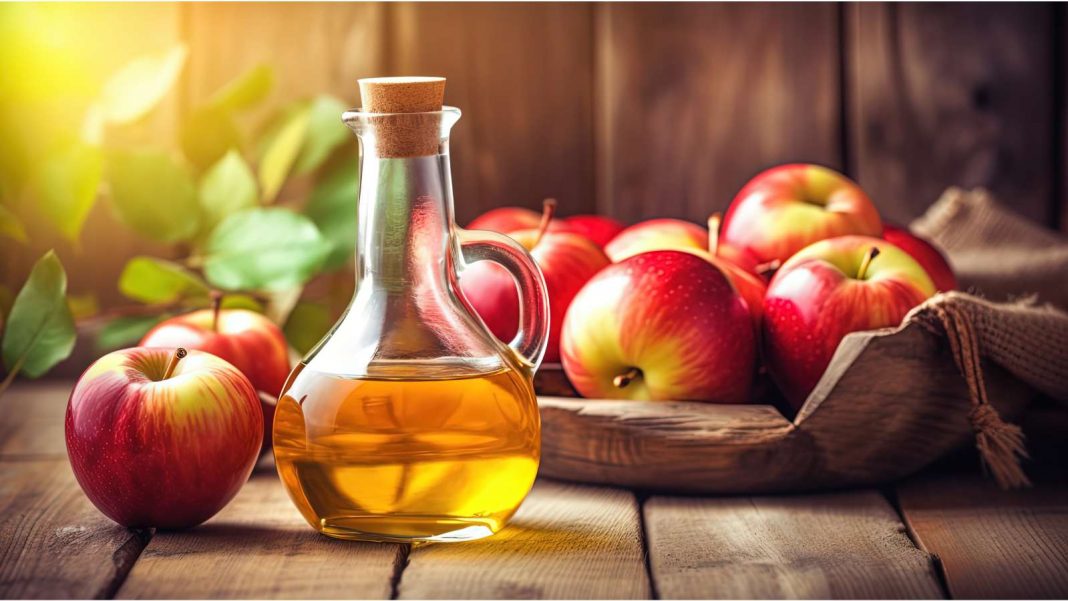When it comes to natural cures, you may find a slew of options. One such ingredient that has gained popularity with numerous beauty benefits is apple cider vinegar (ACV). Rich in vitamins, minerals, and acetic acid, ACV is known for its potential to promote healthy skin and hair. However, before incorporating this acidic solution into your beauty routine, it’s essential to understand its benefits, potential drawbacks, and how to use it safely.
To know the correct way to use apple cider vinegar for hair and skin, HealthShots spoke to Dr Ishmeet Kaur, MBBS, MD Dermatology, Dermosphere Clinic, Venkateshwar Hospital, Dwarka, Delhi. Dr Kaur says, “ACV is a natural remedy for various skin and hair concerns, but its use requires caution to avoid potential risks.
Benefits of apple cider vinegar for skin
1. Maintains pH balance: It is slightly acidic and has antibacterial and antifungal qualities, which can help balance the skin’s pH. This, in turn, enhances the protective skin barrier and reduces susceptibility to irritation.
2. Controls acne and blemishes: The antibacterial properties of ACV may aid in controlling acne-causing bacteria and fungi, potentially reducing breakouts and the appearance of marks and scars over time.

3. Exfoliation: The natural acids in ACV can act as a gentle exfoliant, helping to remove dead skin cells and promoting a smoother, more even complexion.
4. Skin tone: ACV can help even out skin tone and reduce the appearance of dark spots, thanks to its exfoliating effects.
5. Slows down ageing: ACV contains vitamins and antioxidants that contribute to healthier skin by helping to combat free radicals and oxidative stress, which can lead to premature ageing.
B08BCYYRRF
Benefits of apple cider vinegar for hair
1. Dandruff and scalp health: ACV’s antimicrobial properties may help combat dandruff and maintain a healthier scalp.
2. Stimulates hair growth: The natural enzymes and vitamins present in ACV nourish hair follicles and encourage hair growth. Improved blood circulation to the scalp can also aid in faster hair growth.
3. Adds natural shine: ACV can act as a natural hair rinse, promoting shiner, cleaner, and more voluminous hair and removing product buildup.
4. Reduces frizz: ACV smooths the hair cuticle, which helps reduce frizz, making hair appear smoother and more manageable.

5. Controls oil: Since it helps balance the scalp’s pH level, it can promote a healthy hair environment for optimal hair growth. An optimal pH level prevents excess oil production, reducing the risk of greasy hair.
Risk factors of using apple cider vinegar for skin and hair
Apple cider vinegar has gained popularity as a natural remedy for skin and hair issues, but it’s essential to be aware of potential risks. Here are the risks of using apple cider vinegar for hair and skin:
- Its high acidity may cause irritation, redness, or even chemical burns, particularly if used undiluted.
- ACV can disrupt the skin’s pH balance, leading to dryness and sensitivity, especially in those with sensitive skin or conditions like eczema.
- ACV might strip away natural oils and proteins from hair, leaving it brittle and prone to breakage.
- Excessive use of it may also fade hair color. In fact, improper use might exacerbate scalp conditions.
- Prolonged or excessive use of ACV can potentially lead to more severe complications, such as hair loss.
Consulting a dermatologist before integrating ACV into skincare or hair care routines is advisable to mitigate these risks!

How to use apple cider vinegar for hair and skin?
To use apple cider vinegar effectively for hair and skin, follow these guidelines:
1. Dilution: Dr Kaur says, “Applying concentrated ACV can lead to hair and scalp damage.” Hence, always dilute ACV with water before applying it to your skin and hair. Add one part of ACV and 3 parts of water.
2. Always do patch tests: Before applying ACV to your face and body, perform a patch test on a small area of your skin to check for any reactions or allergies.
B07CN47599
3. Allergic reaction: Dr Kaur says, “Fragile hair should be treated carefully, and those allergic to apples must exercise caution.”
4. Sun protection: ACV’s acetic acid may increase sensitivity to sunlight. Use sunscreen when going outdoors after applying ACV.
5. Acne spot treatment: Dab diluted ACV onto acne spots using a cotton swab. Do this sparingly, and avoid applying it to broken or sensitive skin.
So ladies, keep these tips in mind before you give apple cider vinegar a try for your hair and skin!







